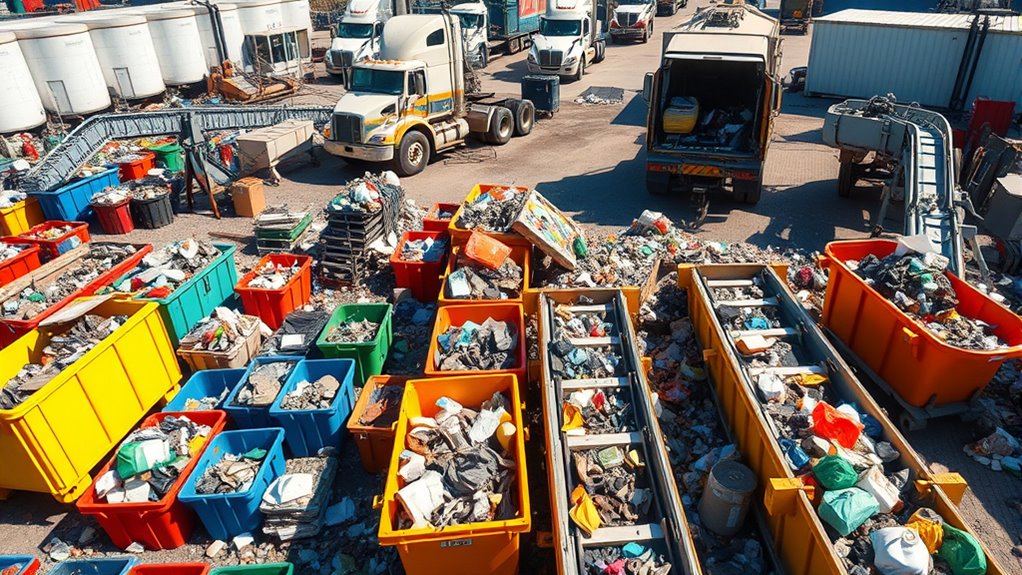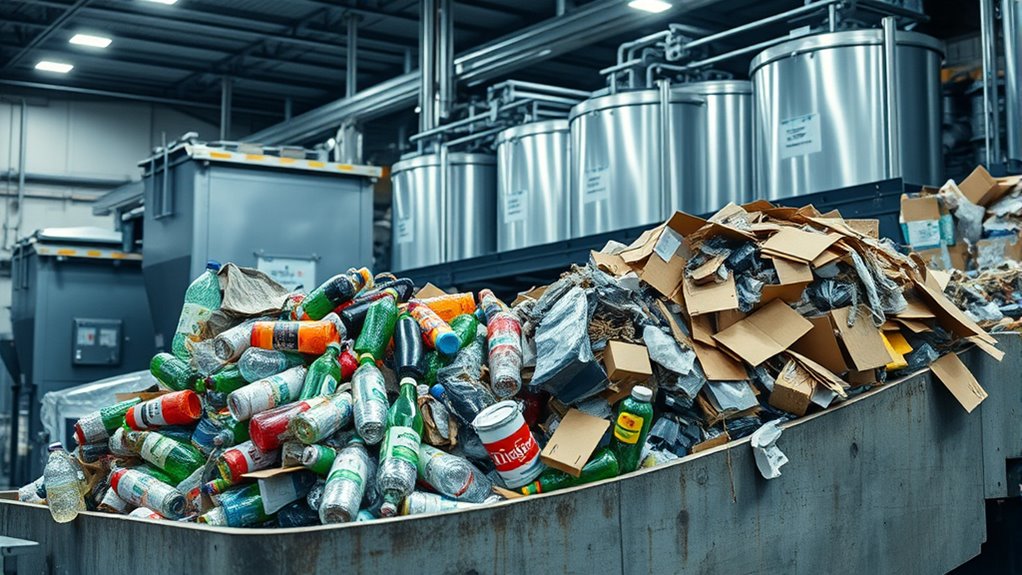Disposal fees are influenced by various factors like regulations, waste types, recycling incentives, and local conditions. Stricter policies and environmental standards increase costs, especially for hazardous or bulky waste. Recycling programs can help lower fees but might add expenses for processing recycled materials. Geographic and infrastructure factors also play a role, with limited landfill space or transportation costs driving prices up. Keep exploring to uncover how these elements shape your waste processing charges.
Key Takeaways
- Disposal fees are influenced by landfill regulations, waste type, and environmental standards, which can increase operational costs.
- Stricter regulations, especially for hazardous waste, lead to higher processing expenses passed to consumers.
- Recycling incentives can lower overall waste volume but may add costs due to specialized processing requirements.
- Larger, hazardous, or contaminated waste incurs higher fees because of increased handling and environmental risks.
- Geographic factors like landfill availability and local laws significantly impact the final waste disposal charges.

Have you ever wondered why disposal fees vary so much or what they actually cover? It turns out, these charges aren’t random; they’re influenced by a range of factors, including policies like landfill regulations and efforts to promote recycling incentives. Landfill regulations are put in place to ensure waste disposal is safe, environmentally responsible, and compliant with local laws. These rules often mandate specific procedures, such as how waste is sorted, the types of materials accepted, and the standards for landfill lining and leachate management. Complying with these regulations can increase operational costs for disposal facilities, which get passed on to consumers in the form of higher disposal fees. The stricter the regulations, the more expensive it becomes to process waste, especially when it involves handling hazardous materials or implementing advanced environmental protections.
Disposal fees reflect regulations, environmental policies, and recycling efforts that ensure safe, responsible waste management.
Recycling incentives also play a big role in shaping disposal fees. Many local governments and waste management companies encourage residents and businesses to recycle by offering incentives like reduced fees or deposit-return schemes. When you participate in recycling programs, the overall waste volume decreases, which can lower disposal costs for facilities. However, recycling isn’t always cheap; sorting, processing, and remanufacturing recyclable materials require specialized equipment and labor, which adds to the expense. Facilities might charge higher fees for waste that cannot be recycled or for contaminated recyclables, which are more costly to process or dispose of safely. Additionally, the presence of spoiled or contaminated waste can significantly increase disposal costs due to the need for extra handling and disposal precautions.
Furthermore, the type and size of waste you’re disposing of influence the fee structure. Hazardous waste, bulky items, or construction debris often come with additional charges due to their potential environmental impact and the extra precautions needed to handle them properly. The geographic location also impacts disposal costs; areas with limited landfill space or stricter environmental laws tend to have higher fees. Transportation costs, local infrastructure, and availability of disposal sites all factor into the final price you pay.
In essence, your disposal fees reflect a complex web of regulations, environmental policies, and economic considerations. They’re designed not only to cover the cost of waste processing but also to incentivize environmentally responsible behaviors, like recycling and waste reduction. So, the next time you see a disposal fee on your bill, remember it’s more than just a number—it’s a reflection of efforts to protect our environment, comply with regulations, and promote sustainable waste management practices. Understanding these factors helps you see the bigger picture and appreciate the importance of responsible disposal methods.
Frequently Asked Questions
How Are Disposal Fees Calculated for Hazardous Waste?
When calculating disposal fees for hazardous waste, you consider its classification, which determines handling requirements. The disposal fee components include waste volume or weight, transportation costs, and treatment or disposal methods needed. You’ll find that more hazardous or complex waste types generally incur higher fees due to stricter regulations and specialized processing. To get an accurate estimate, review your waste’s classification and associated disposal fee components thoroughly.
Do Disposal Fees Vary by Geographic Location?
You might think disposal fees are the same everywhere, but regional variations and local regulations cause differences. These factors influence the costs because disposal facilities face varying operational expenses and compliance requirements. So, your fees can fluctuate depending on where you are, and it’s crucial to understand local rules. Don’t assume fee structures are universal; always check with local waste management authorities for accurate, location-specific information.
Are There Discounts for Large-Volume Waste Disposal?
You might find discounts for large-volume waste disposal through bulk discounts or loyalty programs. Many waste management companies offer these incentives to encourage repeat business, so if you’re disposing of significant amounts regularly, ask about potential savings. Keep in mind that discounts can vary by provider, location, and the volume you’re disposing of. Taking advantage of these options can help you save money on your waste processing costs.
Can Disposal Fees Change Over Time Without Notice?
Did you know that about 60% of waste management companies can change disposal fees without prior notice? You should be aware that pricing fluctuations are common in the industry. Typically, companies aren’t required to give notice before adjusting fees, so it’s wise to review your billing statements regularly. Staying informed helps you avoid surprises and plan your waste disposal budget effectively.
What Are the Penalties for Non-Compliance With Waste Disposal Regulations?
You face liability penalties if you don’t comply with waste disposal regulations, which can include hefty fines or legal actions. Non-compliance increases your compliance costs, as you may need to pay for corrective measures or face penalties. Staying informed and following proper disposal procedures helps you avoid these risks, ensuring you meet legal standards and minimize financial consequences while protecting the environment and your reputation.
Conclusion
Now that you understand disposal fees, you can make informed decisions, save money, and reduce surprises. You can compare costs confidently, plan your budget wisely, and advocate for transparency. With this knowledge, you can navigate waste processing charges with clarity, confidence, and control. Empower yourself to ask questions, seek answers, and challenge misunderstandings. Because when you understand disposal fees, you take control of your waste management, and you turn confusion into confidence, uncertainty into clarity, and frustration into empowerment.









